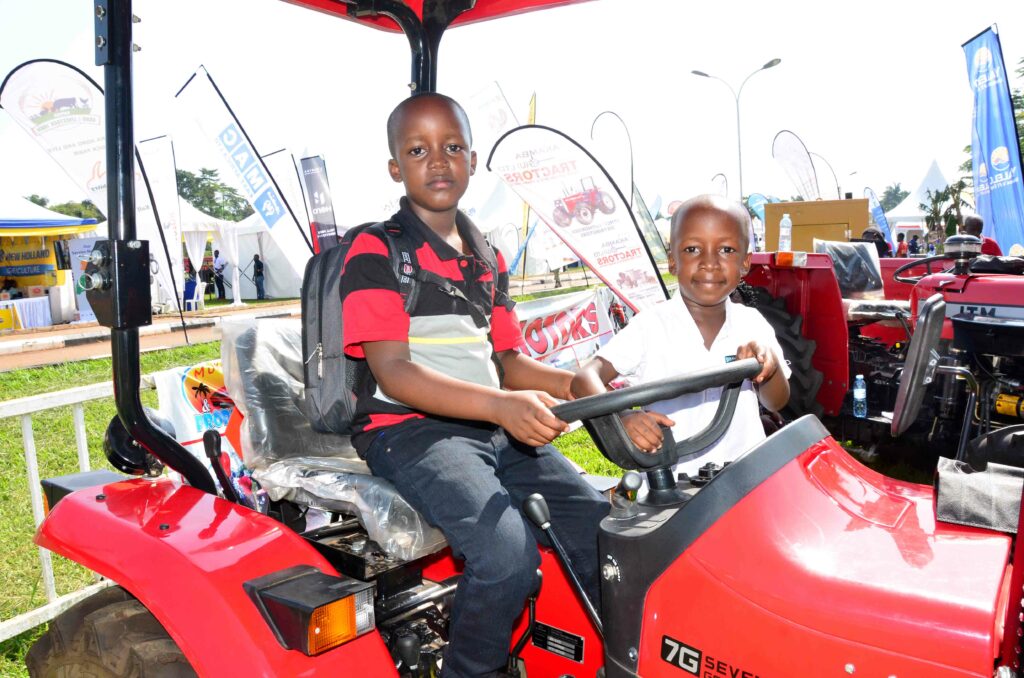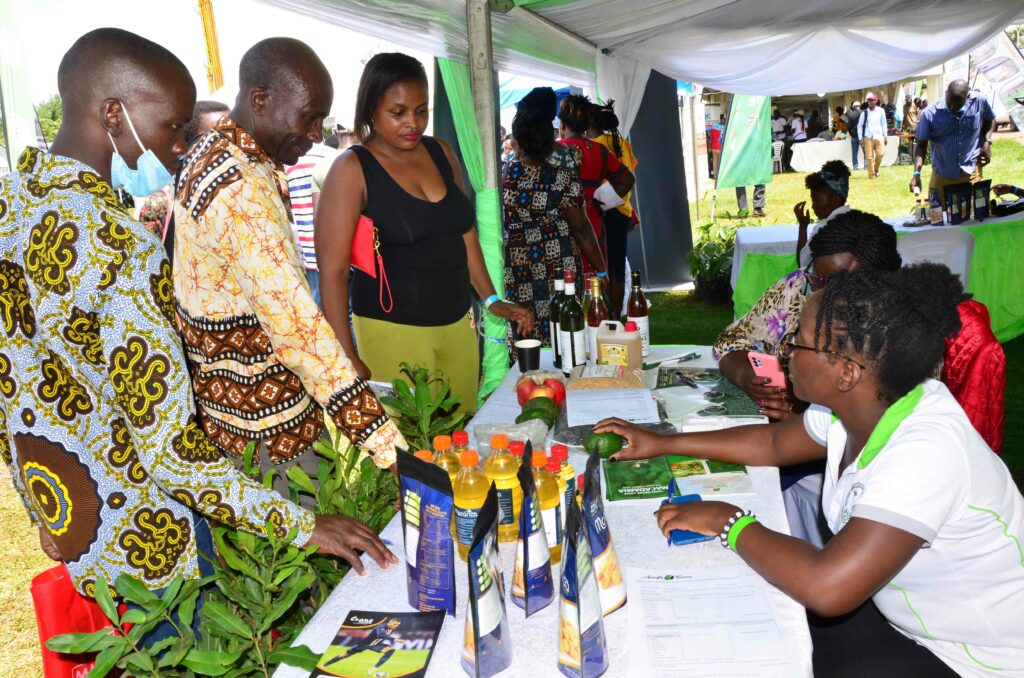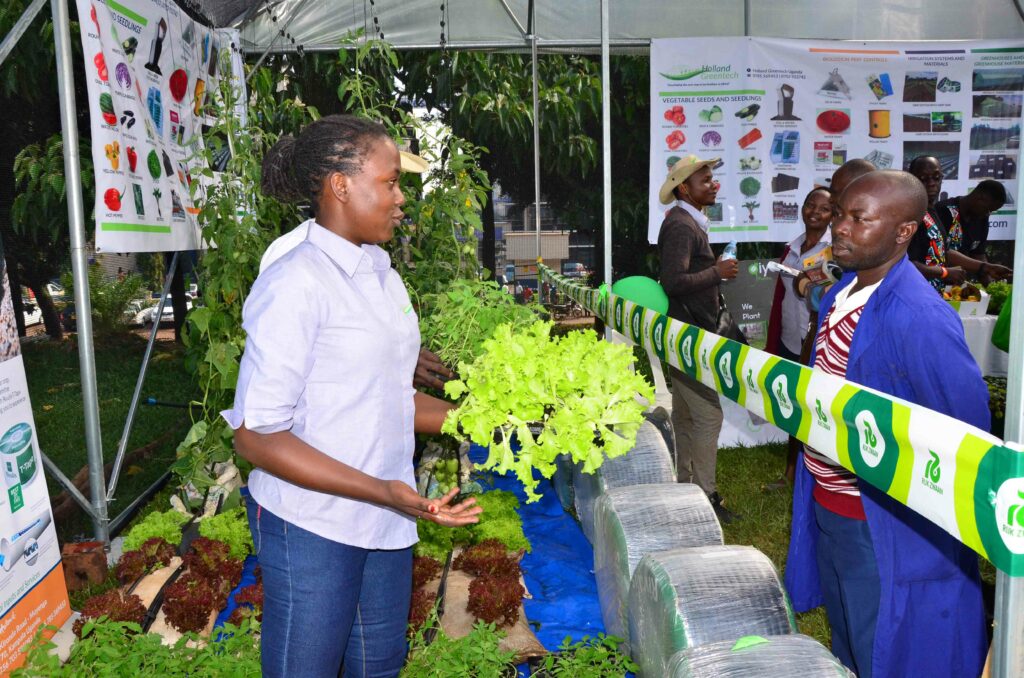By HERBERT MUSOKE
The Harvest Money expo 2023 introduced new innovations aimed at making farming more profitable by improving farm production and productivity in addition to new items that created excitement and attracted visitors.
The innovations were across the sectors in seeds and planning material, breed improvement, soil management and fertility, value additions, machinery.
The 2024 Harvest Money Expo is set to be held between February 23 and February 25th.
CROPS
Holland Greentech is one of the many companies that exhibited hybrid seeds that can be grown in different conditions. Debra Milly Namande explains that farmers should understand the type of seed they are buying because seeds are made for different conditions yet many just buy and end up losing money because these conditions don’t allow them to perform to their best capacity.
“We have seed varieties made for open fields and others for greenhouse. Also, some varieties are resistant to certain conditions yet others are not. All these make a difference in the yields that one will harvest at their farms,” she explains.
She therefore advises farmers to be careful with where they buy the seeds and also ask questions on what they don’t understand such that they buy seeds that will give them value for money.
Jayrows Innovations Farms exhibited the Banana macro-propagation technology where a farmer can have a number of clean banana suckers for planting for the variety of their preference.
Rowland Abaho the director of Jayrows Innovations Farms and a plant doctor explains that this method makes it easier for a farmer to have clean suckers in the shortest time possible and at a cheap price. To have these suckers, you need a sucker of the variety you want to propagate to get a rhizome/corm. It’s cleaned using organic concoction from hot paper, tobacco among others into which it is soaked for 12 hours.
You are further advised to get a sharp knife and cut off the lateral buds from which a new sucker would grow and then bisect it into four. Do this around the corm and also destroy the aerial stem to ensure there is no other part that can grow into suckers apart from the bisected buds.

The floor should be for concrete to avoid soil-borne diseases and bacteria to enter the corm but also allow water used for irrigation leak. Have saw-durst which is going to be used to cover the sucker and white polyethene of 1,000gage which is used to cover the corm in saw-durst to create a hot-humid condition that stimulates sucker growth as you irrigate twice a day.
Here, for matooke varieties suckers will start coming out in three weeks and for Bogoya, apple bananas (Ndiizi and Gonja), will take a month. After about a week, they will be ready for porting in treated soils.
The potted suckers should be kept in a shade made with 75% shade net. In one month the matooke varieties will be ready for transplanting to the main garden and bogoya and apple bananas will be ready in two months.
Apart from propagating for personal planting material, one can do it as a business because for the first round you can have four suckers per a bud and in the second round will get 16 suckers because from where you get a sucker you bisect it into four parts. This can be done for about 3-4 rounds until it can only produce about two suckers per bud.

Dragon fruit
This is one of the fruits that caught the attention of many visitors at the Expo. Muawiya Mukasa the director of Kalf at Kapeeka who exhibited the fruit explains that this is one of the most nutritious fruits with a big market locally and internationally.
He says that the fruit grows anywhere because it needs less water to grow and fruit. “It can fruit for 15 years and a kilogram costs sh28, 000 yet 3-4 fruits make a kilogram,” he explained.
Many of those who visited the stall bought seedlings and also had a taste of the fruit but he advised those who wish to grow it as a business to first visit his farm at Kapeeka to have a bette understanding of how the crop is done.
Soil management
Soil is a key factor in crop farming which thus needs to be managed well to ensure production and higher yields for all plants.
Preisma Foods Ltd exhibited Soil water nutrient retainer which is a macro molecular synthetic polymer material with high water absorption capacity. Joachim Birungi the sales manager at Preisma Foods explains that it has a water uptake of up to 400 times its own weight in a very short time thus forming water granules at the root zone that improves soil aeration.
It can also absorb fertilizers and pesticides and release them slowly to the plant root zone adding to their efficiency. It helps to create a moist environment around the plant root zone to promote growth and yield even during the dry season.
Organic fertilizer
Fertiplus & Bora was also one of the spots that attracted a number of visitors as farmers were looking for ways to manage soil fertility but also its health to continue supporting production by using organic fertilizers that are friendly to humans and the ecosystem.
“For a sustainable productivity, we need to care for the soil to enable it to continue supporting crop growth and productivity. We have three types of fertilizers, two of which are imported from the Netherlands and one is made locally in Uganda,” he says.
This fertilizer is good for all crops as it is effective since it has all the nutrients needed by the crop for best growth and production and is less costly making it affordable for all.
Improving breed
In livestock, animals are kept for meat or milk production and the more milk one gets from their cows the higher the profitability of the farm. Therefore, farmers for long have been looking for heavy milking breeds.
Many farmers flocked URUS stall to understand how they can get the improved semen it imports from around the world and how they can use it to improve their hard for increased production and productivity of their farms.
Daphine Ahumuza from URUS explains that they have over 10 breeds from America and other renowned countries in the world that produce high milk producing bulls that can be used by farmers to improve their hard to produce up to 45 liters of milk a day.
“We also have semen for beef cattle including the most expensive Kobe-beef breed cattle. Also, we have pregnancy tasting kits other than waiting for cows to go back on heat as a sign of a failed conception, which leads farmers to losses because a cow may take about 3-4 months which means you will take close to two years to get another calf,” she adds.
Farmers no longer need to wait for the heat but use technologies to test their cows’ pregnancies within 28 days and if the cow did not conceive, a farmer will prepare it and will be back on heat in the next few days and be served.
Cheaper concentrate
Cristopher Magezi the manager at Champrisa International the distributors of Hendrix concentrate in Uganda explains that after realizing that the price for maize had gone up, they modified their concentrate and made it cheaper.
“We improved the ingredients in our concentrate such that farmers can now use maize bran to mix feed other than using broken maize only as it used to be. This makes the feed cheaper making it possible for the farmer to make profits from their farms,” he says.
Also, at the stall they showcase other products like Dry care powder which is an organic powder with good aroma that will purify the air thus preventing your animals from being affected by ammonia.
The powder can be applied in poultry housed both layers and broilers, pigs and dairy houses and water pits.

Pet birds
At Doris Kairu of Bukonte Farm from Kayunga’s stall, there were local poultry among which there were two chicken and one pajeon breed used as pet birds yet very expensive.
The two chicken breeds were; silk chicken which originate from America. They very small white chicken with black skin and meat and has a blue spot at the lock comb. Its feathers are very soft like far that can be used to make pillows.
The second breed was the Polish chicken from Poland that can live 7-9 years. It`s York occupies a bigger part than the white and it is yellow and tasty.
These birds are sold in pairs where a pair goes for sh300, 0000 and she sold all the birds as people wanted to have them in their homes.





